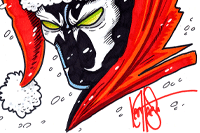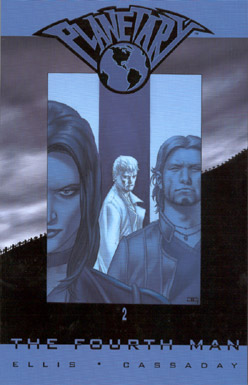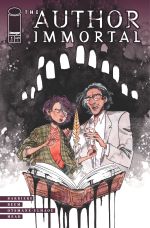WAITING
FOR TOMMY
By
Richard Johnston Adisakdi
Tantimedh recent two part prestige series, JLA: AGE OF WONDER
just shipped, telling a steampunk story about the origins
of the JLA at the turn of the nineteenth century. Well received,
it has however been a long time coming. Rich Johnston talked
to this relative newcomer (though he's been doing comics for
almost twenty years) about the industry, the future and how
DC is changing the way it does business.
RICHARD
JOHNSTON: Your recent JLA: Age Of Wonder came out very
recently. Are you proud to be one of the last Elseworlds creators?
ADISAKDI TANTIMEDH: Yes, I'm also proud to be one of
the creators of one of the last *good* Elseworlds.
RICHARD:
How has the imprint's relationship with quality been, in your
opinion?
ADI: I remember in the 90s, many of them were very
good, since there was genuine thought put into the stories,
in books like BATMAN: HOLY TERROR and the like. Somewhere
along the line, it felt like the books lost their way a bit...
(more coming next) I remember that bizarre Elseworlds where
all the men in the world were wiped out and Superman had to
repopulate it. So you ended up with a story that was all about
Superman's *sperm*! But at least that had a kind of demented
quality about it.
In the
last two years, there really didn't feel like much of a point
to the Elseworlds books other than to put them out for the
sake of it. I remember looking at JLA: ISLAND OF DR. MOREAU,
and, despite the nice Steve Pugh art, thinking, "What the
f**k does Dr. Moreau have to do with the JLA??" Wells' original
novel was already perfectly self-contained in itself (and
it wasn't even his best work), so unless you could find a
way to use DC superheroes to give it an extra layer to create
a new understand of both aspects, what's the point in saying
a bunch of mutated animals are another version of Superman
or Batman? At least with AGE OF WONDER or RED SON, there was
a real attempt to engage with politics and culture through
the use of the likes of Superman.
There
was a distinct sense of Shark Bukakke setting in... So unless
there really is a point to the story, it's probably just as
well that the Elseworlds line is being put to rest.
RICHARD:
Do you think Age Of Wonder succeeded?
ADI: By and large, I think we told the story we wanted
to tell and I was happy with that. Whether or not it succeeded
is up to the readers to decide, I think. I did have fun writing
it, though, since it felt like I was writing a BBC Historical
Epic with a budget of $200 million, which is what it would've
cost if it was a movie.
RICHARD:
How long did the process take? From pitch to publication?
ADI: Let's see... I pitched it back in late 1999/early
2000, so it's been slightly more than three years.
RICHARD:
Ouch... DC has been criticised in the past for its long gestation
period, what do you think took so long?
ADI: Bear in mind there was a lot of research to do
before I even started scripting, after the book was commissioned,
and then there was the very extensive plotting of the story,
since it was an epic that took place over 30 years with a
large cast of characters. There was also the process of finding
an artist, and then the artist having to do his own research
in the period, which, since it involved the actual look of
the fashion, architecture and technology of the period, also
took a fair bit of time. The script descriptions were also
very elaborate. And the pace of the artist was determined
by the sheer detail he had to put in.
And let's
not forget a very busy editor who was dealing with at least
four, five other books at the same time. So all of that added
up. I finished the final draft of the script in May 2001 and
from there it was out of my hands. Suffice to say, DC, understandably,
do not want any projects to take that long to come out ever
again, and I certainly don't blame them.
RICHARD:
It seems bizarre that the system we have means that the books
were on sale for a month and then "poof", into the stratosphere.
DC have made a point of saying prestige format mini-series
are very hard to reprint, and collections are rare. Do you
feel a sense of loss over the very ethereal nature of the
work?
ADI: Definitely, and that seems to be an especially
unfortunate aspect of the Industry, since there's so much
brilliant work through the decades that have been lost and
forgotten because of that.
Pages:
1 | 2
| 3 Continued
Here...
|







